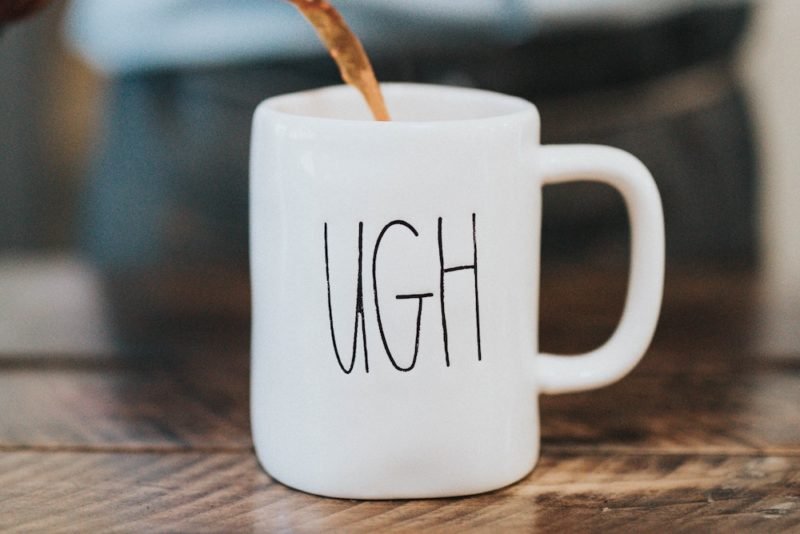
Want to know what simultaneously breaks my heart and makes me want to punch something? When I hear the stories of stigma, shame and self-doubt my clients experience simply because they have the audacity to walk this earth in a body that is deemed larger than what’s appropriate.
Last week, The Washington Post published an article I wrote about the kerfuffle over Nike’s plus-size mannequin, and what that kerfuffle says about our society. And what is says isn’t pretty. I also pointed out the utter, total, raging hypocrisy of on the one hand, lambasting people in fat bodies if they don’t exercise, then on the other, saying they don’t deserve to have exercise clothing that actually fits their body. Like, what, they’re supposed to hit the gym or go for a run naked? In what world does that make sense?
In that article, I had intended to include the personal experience of one of my clients (with her permission), but it landed on the cutting room floor during editing. So I’m going to tell a bit of her story here, because it’s a story with elements that while certainly personal to her, are unfortunately symptomatic of a universal problem.
When healthcare isn’t healthful
My patient is a retired women in a larger body. She has a decades-long history of trying to control her weight, with all the losses and gains (weight cycling) chronic dieting usually entails. She’s also athletic, and loves to exercise. Like, really loves it. Hiking, walking, running, spin class, dancing, swimming, yoga, weight lifting—all good in her book.
When she started seeing me a few months ago, her weight was on the higher side, in the aftermath of a major health event a few years back. When that event happened, she was pretty close to what was realistically the lowest weight her body would allow, but she was still technically in the “overweight” range on the BMI chart. She was exercising a lot and following one of the popular lower-carb diets. When she expressed her concerns to her doctor—during her pre-surgical appointment—that her health problem might kill her, her doctor said that her condition wouldn’t kill her, but her weight would.
WTF?! Not only is that untrue, but what a lovely thing to hear when you’re about to undergo surgery.

The suppression of joy
Bringing this back to exercise, the shame my client experienced at the hands of the healthcare system (one of the first things she expressed to me was her concern that she had “caused” her health scare. Another thing she expressed to me was that her deep guilt over starting to regain weight after having surgery stopped her from participating in many of the forms of physical activity that she loves. She realized that this was a pattern that repeated each time she lost weight and then started to regain.
“I felt ashamed and embarrassed, so I would always pull back,” she said. “I’ve stopped doing things I enjoy, I’ve lost opportunities.”
One of those opportunities was becoming a spin instructor. She had been accepted to the teacher training program, but dropped out when she started to gain weight. (Even worse, she also started avoiding doctors, which meant missing out on preventive health screenings that are important for everyone, but especially for someone who had survived her particular health crisis.)
The 2018 Physical Activity Guidelines for Americans says, “Health is a human condition with physical, social, and psychological dimensions… . Positive health is associated with a capacity to enjoy life and to withstand challenges; it is not merely the absence of disease.”
Why should anyone suppress anyone’s capacity to enjoy life by shaming them or making them feel less than? Who do those people think they are?
Turning a corner
Fortunately, not only is my client now happily engaging in all of her beloved activities—and getting at handling uncomfortable feelings about being the largest woman in the yoga class, or being in a bathing suit and running into someone who knew her when she was in a smaller body—but she’s getting the healthcare she needs and advocating for herself with her doctors. This is huge.
One of those times I wanted to punch something was when she told her doctor what she was doing for exercise, and that she was working with me, a registered dietitian nutritionist. Her doctor responded by recommending a commercial weight loss program (claiming that it has a high record of success, which is untrue) and prescribing a generic exercise plan.
Again, WTF?! How is that evidence-based medicine? This 2017 systematic review and meta-analysis outlines the ineffectiveness of commercial weight-loss programs, while this 2017 review calls out the major disconnect between weight loss claims on these programs’ websites, and what data from randomized controlled trials actually show. Will you find some studies showing good results? Sure, but those studies don’t follow their participants long enough to get into the timeframe where weight regain typically starts to happen.

Fanning the flames of justice
My client was in an appointment with another healthcare provider, and when she asked if she needed to temporarily cut back on activity while adjusting to a new medication, the doctor gave her a clear, “You exercise?” look. She wasn’t imagining the look: her husband, who was in the room with her, also noticed. She also has this disbelief coming at her constantly from even well-meaning friends and acquaintances.
Fortunately, my client, fueled by indignation about past treatment (righteous indignation, I pointed out to her), is standing up for herself. On her next appointment with the doctor who prescribed cookie-cutter weight loss and exercise, she reiterated what she was already doing, and actually received some acknowledgement, and a positive response, back. She’s also expressed how the stigma she’s experienced led her to avoid follow-up appointments and preventive screenings (HUGE, because this is a big problem in healthcare), and received a tepid response, but at least she made her voice heard, which may have positive ripple effects.
The assumption that you can tell what behaviors someone does or doesn’t engage in based on their body size is not only wrong, but it’s also dangerous. People in larger bodies who constantly get disbelieving looks or comments when they talk about the hike they took or the vegetables they eat may well become demoralized and say, “Well, screw it, then.” People in smaller bodies who exist on frozen pizza and Netflix might never be asked important questions about how they take care of themselves, because it’s assumed that if they are thin, they must be exercising and enjoying their broccoli.
On that note, I give you Samantha Bee, who makes it clear that her doctors should be asking her what she eats—but they don’t, because she’s in a smaller body:
Disclaimer: All information provided here is of a general nature and is furnished only for educational purposes. This information is not to be taken as medical or other health advice pertaining to an individual’s specific health or medical condition. You agree that the use of this information is at your own risk.
Hi, I’m Carrie Dennett, MPH, RDN, a weight-inclusive registered dietitian, nutrition therapist and body image counselor. I offer compassionate, individualized care for adults of all ages, shapes, sizes and genders who want to break free from eating disorders, disordered eating or chronic dieting. If you need to learn how to manage IBS symptoms with food, or improve your nutrition and lifestyle habits to help manage a current health concern or simply support your overall health and well-being, I help people with that, too.
Need 1-on-1 help for your nutrition, eating, or body image concerns? Schedule a free 20-minute Discovery Call to talk about how I can help you and explore if we’re a good fit! I’m in-network with Regence BCBS, FirstChoice Health and Providence Health Plan, and can bill Blue Cross and/or Blue Shield insurances in many states. If I don’t take your insurance, I can help you seek reimbursement on your own. To learn more, explore my insurance and services areas page.
 Print This Post
Print This Post






